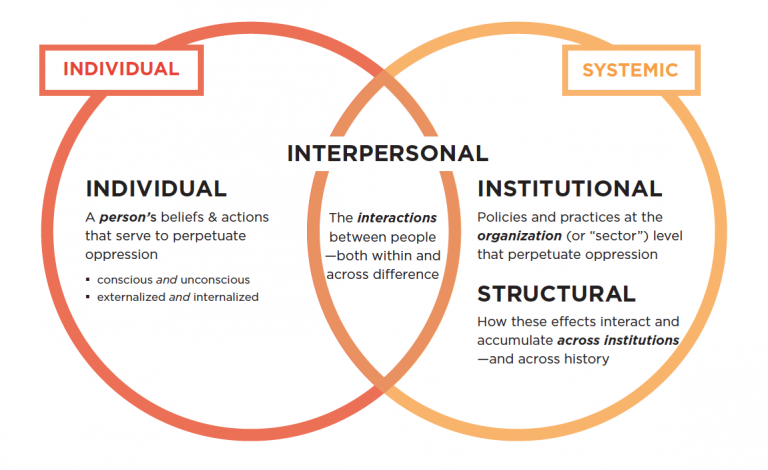The Lens of Systemic Oppression
A “lens” is a metaphor to communicate the idea of looking at an event, experience, and/or a set of data through a particular perspective. The extension of this metaphor being that one can look at what is occurring and construct an interpretation and a subsequent action based on the “lens” being employed at any given time. Each of us views the world through a set of lenses everyday – it is how we read and make meaning of the world.
The lens of systemic oppression is a lens we intentionally employ to sharpen our focus on the ways in which any given form of oppression (race, gender, class, language, sexual orientation, etc) may be negatively impacting people’s ability to make progress on the things they care about and/or preventing individual or collective action toward the achievement of a particular goal.
The purpose of using any given lens is to improve the predictability of our actions relative to a desired outcome. We believe we increase the likelihood of successfully reaching a given set of objectives when we consider what is happening and what action to take from multiple perspectives – if we examine situations, relationships, practices, and policies, etc using multiple critical lenses (inquiry, change management, adult learning, etc). Learning about and applying the lens of systemic oppression is fundamental to coaching and leading for equity.
The Lens of Systemic Oppression assumes that:
All negative forms of prejudice and/or bias are learned and therefore can be unlearned.
Oppression and injustice are human creations and phenomena and therefore can be undone.
Systemic oppression exists at the level of institutions (harmful policies and practices) and across structures (education, health, transportation, economy, etc) that are interconnected and reinforcing over time.
Oppression and systematic mistreatment (such as racism, classism, sexism, or homophobia) is more than just the sum of individual prejudices.
Systemic oppression is systematic and has historical antecedents; it is the intentional disadvantaging of groups of people based on their identity while advantaging members of the dominant group (gender, race, class, sexual orientation, language, etc.).
Systemic oppression manifests in economic, social, political and cultural systems.
Systemic oppression and its effects can be undone through recognition of inequitable patterns and intentional action to interrupt inequity and create more democratic processes and systems supported by multi-ethnic, multi-cultural, multi-lingual alliances and partnerships.
Discussing and addressing oppression and bias will usually be accompanied by strong emotions.
Questions You Can Ask:
How are people talking about the problem they are trying to solve? Is the conversation being had in a way that could lead to productive action?
Who are the people affected by the current inequity being discussed and are they at the table?
What are the specific disparities/inequities we are seeking to eliminate?
How do we understand the forces behind the inequity we see? What forces are perpetuating the disparities we seek to address?
What barriers are in the way of achieving an equitable outcome?
What are the population and geographic targets for our effort? Specifically, for whom and where are we trying to make a difference?
What will equity or racial equity in our OUTCOME look like? How will we KNOW we have made progress? When do we expect to see results? What is our timeframe?
What are the potential UNINTENDED CONSEQUENCES of our proposed solutions/actions? Do the proposed solutions ignore or worsen existing disparities for the group in which we are focused?
Who has power here? What is power based on here?
How are relationships and power differentials affecting the truth that is told and constructed at any given moment?
Where and how does each person locate himself or herself in a conversation?
How are oppression, internalized oppression and transferred oppression playing out right here, right now? (In this school, in this group, in this organization, in this district?) What will I do about it?
How safe is it here for different people to share their truth?
Does the truth telling connect to shared purposes and commitments for action?
How can I build the alliances necessary here to move forward?
How is leadership constructed here? What forms does it take? Who is missing? What can we do to make room for different cultural constructions of leadership?
How can I build my practice as a leader for equity starting with who I am and what I bring because of who I am?

